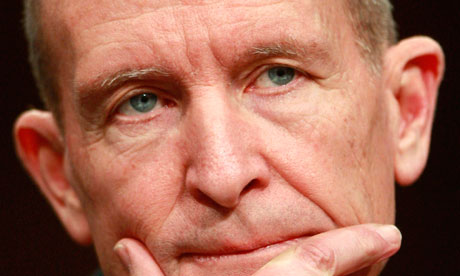Resignation comes after infighting with other administration figures and growing doubts about grip on job

Dennis Blair, the White House’s chief co-ordinator of intelligence in the fight against terrorism, resigned last night at the end of a difficult 16 months in office marked by infighting with other administration figures and growing doubts about his grip on the job.
Rumours have swirled for months in Washington that Blair’s tenure as national intelligence director was ending, following a sequence of turf battles with colleagues and criticism over the way he handled the failed Christmas Day bombing attempt on a plane bound for Detroit.
It is known that Barack Obama interviewed two possible replacements for Blair in advance of last night’s resignation. According to ABC News, Blair offered to resign on Thursday afternoon and Obama accepted. In a statement, Blair said he had offered his resignation “with deep regret”.
The post of DNI was created in 2004 on the recommendation of the 9/11 commission which argued that the failure of intelligence before the attacks on New York and Washington illustrated the need for a strong co-ordinating role in the White House. The office was invested with the task of bringing together intelligence from 16 different government agencies.
But from the start it was racked with problems stemming from lack of clarity about the role and territorial squabbling with other departments.
Under Blair, such infighting had spilled out into the public eye. Last November he was involved in a tussle with Leon Panetta, the politically-adept director of the CIA. Though nominally his boss, Blair lost the battle which was over his desire to chose some of the chief US intelligence officers abroad, a post that has traditionally gone to the CIA station chief.
That dispute became so heated that even the vice-president, Joe Biden, failed to resolve it and in the end Obama stepped in and sided with Panetta.
Following the Christmas Day bomb attempt, in which Umar Farouq Abdulmuttalab allegedly managed to board a plane bound for Detroit carrying explosives, Blair made a number of comments that proved awkward. He said that the suspect should not have been interviewed by FBI agents after his arrest, which angered administration officials who had been portraying the attempted bombing as a criminal matter.
He also referred to a new body, the high-value interrogation group, implying it should have been involved in the questioning even though in fact it was not yet in operation. Terrorism continues to be the most sensitive political issued faced by the president in the wake of 9/11, as any sign of weakness or incompetence is likely to be seized on by the Republicans as evidence that Obama is failing to protect Americans from danger.
Blair has an impeccable CV. A retired admiral from a six-generation naval family, he was a Rhodes scholar in Oxford with Bill Clinton and served as military liaison to the CIA. But despite his credentials he appeared to lack the political cunning needed to make a success of a fiendishly difficult job.
The Guardian


Leave a Reply